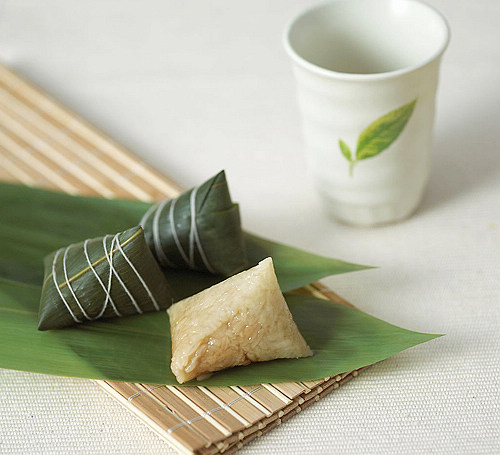|
 |
|
DELICIOUS FOOD: Rice dumplings, with many kinds of fillings, are the traditional food of the Dragon Boat Festival (FILE) |
The festival has more than 20 names, the most of all Chinese festivals, all originating from either the traditional activities of the day or the people related with this day.
For example, since it falls on the fifth day of the fifth month, it is also called Double Five Festival. The name Calamus Festival comes from the herb calamus that people hang on the doors on this day to keep away mosquitoes and worms. The name Herb-Bathing Festival comes from the activity that people always took a herbal bath on the day. The name Unwrapping Rice Dumpling Day comes from a competition where people, before eating rice dumplings, unwrap the leaves and compete to see whose leaves are the longest. Besides rice dumplings, another important food of the day is eggs, so it is also called Egg Festival.
Qu Yuan (339-278 B.C.) was an ancient character who has been widely believed to have connections with the origin of this festival.
Qu was a poet and politician in the ancient state of Chu during the Warring States Period (475-221 B.C.). Qu's political ideas were rejected by the king of Chu who finally was captured by another state Qin. Qin finally took over Chu and Qu committed suicide by jumping into the Miluo River.
After Qu jumped into the river, people went there, searching for him either by swimming in the river or in boats. In order to keep fish away from Qu's body, people threw rice balls into the river to feed them. This is believed to be the origin of the practice of eating rice dumplings and holding dragon boat racing during the festival.
Activities
Rice dumplings have been the most important food of the Dragon Boat Festival since the Jin Dynasty (265-317).
The rice dumplings are mostly cone-shaped with reed leaves wrapping sticky rice fillings. Originally, people just wrapped plain rice in cane shoot leaves. After the Jin Dynasty, people started to add flavoring materials to the rice. These may be mashed red beans, jujubes, chestnuts, salty meat and egg yolks.
The dumplings are categorized by the fillings. Parents like to make jujube dumplings for children as the children are about to take exams since in Chinese the name of the jujube dumpling is pronounced zao zong, which sounds similar with zao zhong, meaning the passing of exams at an early date. This tradition has remained until today in some places.
In the Tang Dynasty (618-907), the rice dumplings were made in subuliform or rhombic shapes, and during the Song Dynasty (960-1279), rice dumplings became very popular. After the Ming Dynasty (1368-1644), reed leaves replaced cane shoot leaves as wrapping material.
Dragon boat racing is mainly popular in the area south of the Yangtze River. Many emperors in China's history, since the Tang Dynasty, enjoyed watching dragon boat racing during the festival. The dragon boats are mostly long and narrow and made in the shape of a dragon. They are made of wood and decorated with colorful paintings. The big boats can hold as many as 100 persons. Before racing, people normally hold ceremonies to offer sacrifice to the gods and pray for safety and victory in the race.
Apart from eating rice dumplings and dragon boat racing, there are many other activities celebrating the festival, including hanging mugwort leaves on the wall, burning Chinese herbs and drinking realgar liquor. Realgar is a kind of white spirit or yellow rice wine. The ancient Chinese believed drinking realgar liquor could keep away disease and evil spirits. Parents even applied realgar liquor to children's foreheads, ears, noses, hands and feet to protect the children from bad luck. In some places, women wear head decorations made of wormwood. People also make paper cuttings of tiger and paste them on windows and gates, since they believed tigers can scare disease and poisonous animals away. People also give a kind of pocket bag, made of silk and containing herbs, as a gift to friends for health and good luck.
The author is a folklorist and senior editor of the Academy Press | 